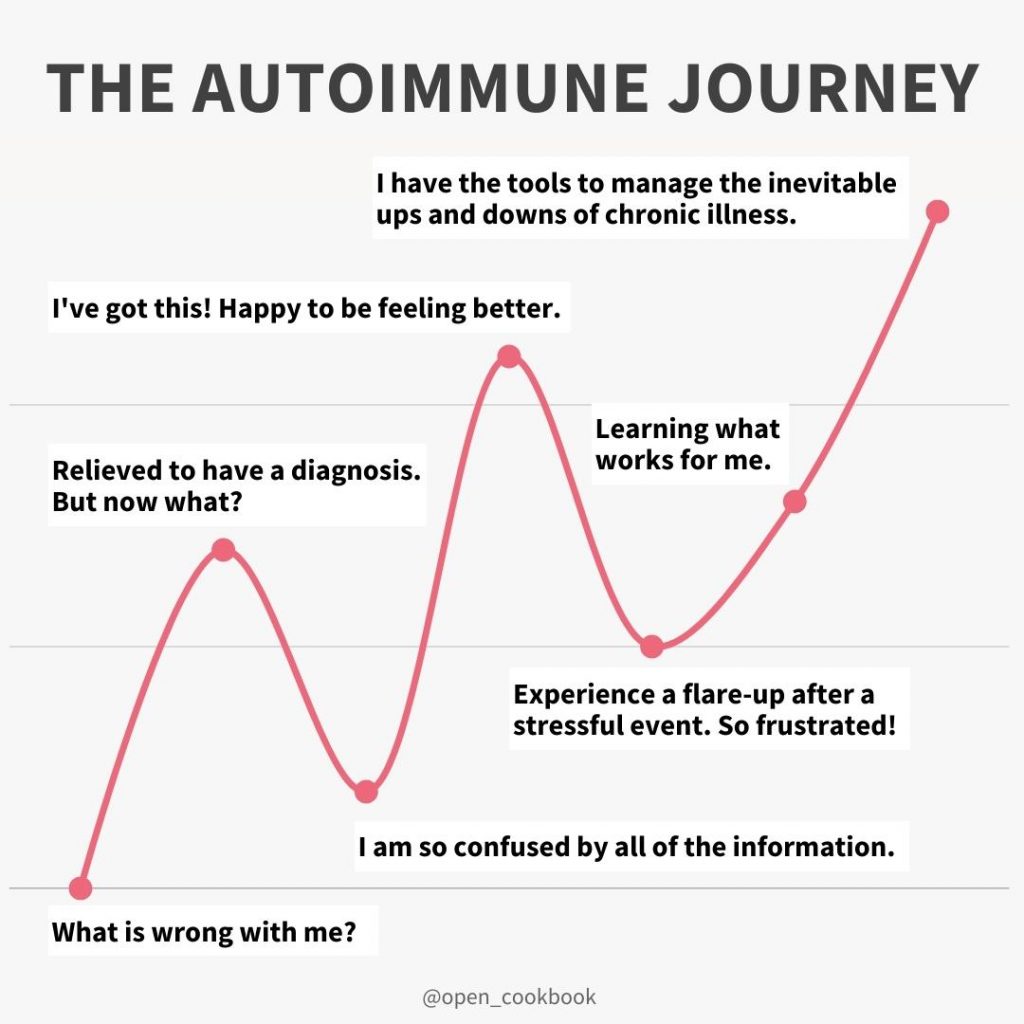Where are you on your autoimmune journey?
There are many personal stages in processing and healing with autoimmune disease. It often starts with mysterious symptoms, leading to years of searching for a diagnosis, and then the relief and grief that comes with managing an autoimmune disease.
Something I hear time and time again is that one of the toughest parts of living with chronic illness is the unpredictability. One moment you feel unstoppable and the next you are beyond exhausted in bed, not sure where you went “wrong.” I know that I can get into that mindset of dissecting every little thing, but please remember that you didn’t do this to yourself.
Autoimmune disease flare-ups are often out of our control (stress and life happens), but through time, the ultimate goal is to learn how to listen to your body, understanding what work for you to bring your body back into balance.

What are some of the common stages of the autoimmune journey?
Stage 1: What is wrong with me?
For years before being diagnosed with Hashimoto’s, UCTD, and EoE, I experienced a lot of mysterious symptoms like constant lightheadedness, migraines, chronic fatigue, anxiety, new food allergies and sensitivities, without any answers. It was really tough being in my twenties, feeling like something was wrong but doctors couldn’t figure it out. I had EKGs and lots of bloodwork performed but everything came back normal. I am sure this sounds familiar to so many of us.
“And so it is a truth universally acknowledged that a young woman in possession of vague symptoms like fatigue and pain will be in search of a doctor who believes she is actually sick.”
― Meghan O’Rourke, The Invisible Kingdom: Reimagining Chronic Illness
The “what is wrong with me” stage is long and arduous. You might even start to question if what you are feeling is actually real but trust me—you know your own body better than anyone else. Please keep searching for answers. There are doctors out there who will listen, take you seriously, and really keep digging until they figure it out.
Stage 2: Diagnosis – Relief & Grief
Now, you finally have a diagnosis that explains your mysterious symptoms. First, you might feel a sense of relief. You now have a name for what is going on with your body and a diagnosis is in your medical chart. Next, comes the grief of having that diagnosis. This can be a very emotional stage and that is normal and perfectly okay. Take your time to feel all of the emotions. It has been a hard journey to get to this point.
Stage 3: What do I do now?
With more answers and a diagnosis, you feel ready to figure out next steps. I know for me this meant lots of time on Google, learning all I could about my autoimmune conditions. This step can feel overwhelming—trying to become an expert on your new diagnosis, learning the treatment options, and determining if making changes to your diet and lifestyle will work for you. Plus, there can be so much conflicting information out there you have no idea where to even start You might even join a Facebook support group or turn to other social media to connect with others who can relate to what you are going through.
It is okay to feel overwhelmed. This is an emotional time. If possible, try to take a step away from all of the research once in awhile and do the things that bring you the most joy—taking a walk in the park, drinking a cup of your favorite tea, playing with your dog, or spending time with friends. Finding support during this time can be really helpful.
Stage 4: The Ups and Downs of Autoimmune Disease
When you are ready to take charge , it can feel empowering. Whether that is through medication, diet, lifestyle, or all of the above. Learning to be your own advocate and learning to listen to your own body is one of the most important steps in managing an autoimmune disease.
The autoimmune journey isn’t linear but you are always moving forward. Flare-ups are often inevitable and it can feel frustrating when you finally feel like you are getting symptoms under control and then an unexpected stressful event happens. It is totally okay to feel frustrated—taking two steps forward and one step back is normal. But try to remember, healing is a process and there will be ups and downs but your are always learning how to best support your body.
Stage 5: Having the tools to live well with chronic illness
We all have our own unique needs and ways of living with autoimmune disease and chronic illness. But through time and learning to listen to your body, it gets easier. Not because there aren’t any ups and downs—the unpredictability of autoimmune disease is one of the hardest parts about living with a chronic condition. Stress happens, flare-ups happen, but being able to listen to your body is something that we can learn to do with experience.
Having the tools that work for you, whether that is getting extra sleep and rest, focusing on including more nutrient-dense foods, taking some deep breaths, or even spending more time doing the things that bring you joy, are ways to help support your body back into balance.
It’s a marathon, not a race
While the saying might be a bit cliché, it rings very true when living with chronic illness. As a Nutritional Therapy Practitioner (NTP) who lives with multiple chronic illnesses, I have experienced the ups and down and known the unpredictability very well. I know first hand how important it is to pace yourself even when you feel discouraged. Learning to manage autoimmune disease is a lifelong process and it takes time to feel confident and empowered.
I would love to connect with you and learn where you are on your autoimmune journey




